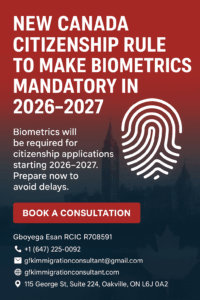
New Canada Citizenship Rule To Make Biometrics Mandatory In 2026-2027
Immigration, Refugees and Citizenship Canada (IRCC) is set to introduce mandatory systematic biometric collection to grant citizenship.
Unlike the past, where biometrics were not generally required for citizenship—though fingerprints were occasionally requested for security or identity checks—this policy will make biometrics mandatory for all applicants by 2027.
In this comprehensive guide, we explore what this change entails and when this change will be implemented for your transformative step toward becoming a Canadian citizen.
Table of Contents
When Will This Change Be Implemented: What Happens Next
What’s New: Canada Citizenship Rule For Biometrics
The proposed amendments to the Citizenship Regulations will mandate the collection and use of biometric information—specifically fingerprints and facial recognition data—for all citizenship grant applications.
This initiative stems from legislative authorities granted in June 2023, allowing IRCC to integrate biometrics into the Citizenship Program for the first time as a standard requirement.
The process will likely mirror existing biometric procedures for other immigration streams, where applicants visit Service Canada or designated private collection centres to submit their data.
Biometrics involve capturing unique physical characteristics to confirm an individual’s identity.
For citizenship processing, this means ensuring the applicant is who they claim to be, reducing risks of fraud or misrepresentation.
The system will cross-reference biometric data with national and international databases, such as those used by the Royal Canadian Mounted Police (RCMP) or Interpol, to verify identities.
This is a significant departure from historical practices, where biometrics were not generally required for citizenship applications.
According to IRCC’s official resources, citizenship applicants were exempt from biometric collection, though fingerprints were occasionally requested in specific cases, such as security checks, criminal record verification, or to distinguish between applicants with similar names.
The regulations will outline how biometrics are collected, stored, and used, with strict adherence to Canada’s Privacy Act.
This includes safeguards like data encryption, limited retention periods, and restricted access to authorized personnel.
The initiative is not part of a formal bilateral or international regulatory agreement, meaning Canada is tailoring this approach to its needs, though it draws inspiration from global best practices in countries like the United States, Australia, and the United Kingdom, where biometrics are standard for immigration and citizenship processes.
IRCC expects biometrics to streamline identity verification, eliminating manual checks that often delay applications.
This is critical given Canada’s high volume of citizenship applications—over 300,000 processed in 2024 alone, per IRCC data.
The change also addresses gaps in the current system, where occasional fingerprint requests were inconsistent and lacked a standardized framework.
When Will This Change Be Implemented: What Happens Next
This initiative is in the early stages of development, with pre-publication of the proposed amendments in the Canada Gazette, Part I, targeted for 2026.
This will include a public comment period, likely 30 days, allowing stakeholders—applicants, advocacy groups, immigration consultants, and community organizations—to provide feedback.
IRCC will use this input to refine the regulations, addressing concerns like cost, accessibility, and privacy.
Final publication in the Canada Gazette, Part II is planned for 2027, after which the biometric requirement will take effect for all citizenship grant applications.
Between now and 2026, IRCC will focus on developing infrastructure, such as expanding biometric collection centres across Canada, to support implementation.
IRCC will also conduct internal assessments to determine fee structures, data storage protocols, and public communication strategies.
Applicants and stakeholders should monitor IRCC’s website for updates on implementation details, collection centre locations, and consultation opportunities.
Engaging in the 2026 comment period will be critical to shaping a policy that balances security with inclusivity.
As Canada continues to welcome over 300,000 citizenship applicants annually, this change underscores its commitment to balancing openness with security, reinforcing its global reputation as a leader in immigration policy.
Share this article to spread awareness about this critical change. Your voice matters in shaping Canada’s citizenship future—stay informed, get involved, and prepare for the biometric era of citizenship processing.
What are the eligibility requirements for applying for Canadian citizenship?
To apply for citizenship as an adult (19 or older), you must: be a permanent resident of Canada, have lived in Canada for at least 3 out of the last 5 years (1,095 days), have filed your taxes (if required), pass a citizenship test (if aged 19-54), and prove language skills in English or French (if aged 19-54). You must also not have certain criminal convictions or be under a removal order. Minors under 19 have different requirements, often tied to a parent’s status or application.
How long does the Canadian citizenship application process take?
Processing times vary, but as of 2025, it typically takes 12-18 months to process a complete adult citizenship application, assuming all documents are correct. Delays can occur due to incomplete applications, additional document requests, or security checks. You can check current processing times on the Government of Canada’s Immigration, Refugees and Citizenship Canada (IRCC) website.
Can I keep my original citizenship when I become a Canadian citizen?
Yes, Canada allows dual or multiple citizenships. You can retain your original citizenship unless your home country prohibits it. Check with your home country’s government to confirm their rules, as some countries require you to renounce citizenship upon acquiring another.
What is the citizenship test, and how can I prepare for it?
The citizenship test is for applicants aged 19-54 and assesses knowledge of Canada’s history, geography, government, and rights and responsibilities of citizenship. It’s usually a 30-minute written test with 20 multiple-choice questions; you need 15 correct answers to pass. Study the official guide, Discover Canada: The Rights and Responsibilities of Citizenship, available free on the IRCC website, and use online practice tests for preparation.
GFK Immigration
Gboyega Esan RCIC R708591
Phone: +1 (647) 225-0092
#CanadaPR #Citizenship #GFKImmigrationExperts #studyincanada #Steinbach #canada #Alberta #studyinaustralia #ielts #studentvisa #studyinusa #studyvisa #immigration #canadavisa #visa #education #internationalstudents #overseaseducation #study #canadaimmigration #ExpressEntry
